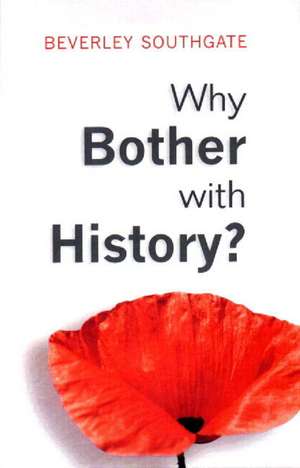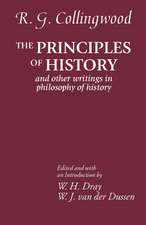Why Bother with History?: Ancient, Modern and Postmodern Motivations
Autor Beverley C. Southgateen Limba Engleză Paperback – 28 noi 2000
Why Bother With History?
argues for an increasingly important role for a revitalised historical study. Examining the motivations of past historians, the author rejects the ancient aspiration to a 'history for its own sake' and argues that historians' importance lies in their own adoption of a moral standpoint, from which a story of the past can be told, that facilitates the attainment of a future we desire.
Inevitably controversial, in that it challenges many of the assumptions of modernist history, this is an interdisciplinary book, which draws in particular on psychology and literature.
| Toate formatele și edițiile | Preț | Express |
|---|---|---|
| Paperback (1) | 483.54 lei 6-8 săpt. | |
| Taylor & Francis – 28 noi 2000 | 483.54 lei 6-8 săpt. | |
| Hardback (1) | 1107.61 lei 6-8 săpt. | |
| Taylor & Francis – 27 apr 2015 | 1107.61 lei 6-8 săpt. |
Preț: 483.54 lei
Preț vechi: 568.87 lei
-15% Nou
Puncte Express: 725
Preț estimativ în valută:
92.54€ • 95.88$ • 77.23£
92.54€ • 95.88$ • 77.23£
Carte tipărită la comandă
Livrare economică 21 martie-04 aprilie
Preluare comenzi: 021 569.72.76
Specificații
ISBN-13: 9780582423909
ISBN-10: 0582423902
Pagini: 198
Dimensiuni: 156 x 234 x 12 mm
Greutate: 0.29 kg
Ediția:New.
Editura: Taylor & Francis
Colecția Routledge
Locul publicării:Oxford, United Kingdom
ISBN-10: 0582423902
Pagini: 198
Dimensiuni: 156 x 234 x 12 mm
Greutate: 0.29 kg
Ediția:New.
Editura: Taylor & Francis
Colecția Routledge
Locul publicării:Oxford, United Kingdom
Public țintă
UndergraduateCuprins
1. History for History's Sake. 2. History and Historical Examples. 3. History and Psychology. Identity: Memory and Forgetting; Meaning and Purpose. 4. History, Politics and Power. 5. History and Religion. 6. History and Education.
7. Postmodernism, History, and Values. 8. Postmodern History and the Future.
7. Postmodernism, History, and Values. 8. Postmodern History and the Future.
Notă biografică
Beverley Southgate is Reader Emeritus, University of Hertfordshire. His many publications include History- What and Why? (1996).
Descriere
Using examples from antiquity to the present, this timely and relevant volume argues for an increasingly important role for a revitalised historical study. Examining the motivations of past historians, the author rejects the ancient aspiration to a 'history for its own sake' and argues that historians' importance lies in their own adoption of a moral standpoint. Inevitably controversial, in that it challenges many of the assumptions of modernist history, this is an interdisciplinary book, which draws in particular on psychology and literature.















